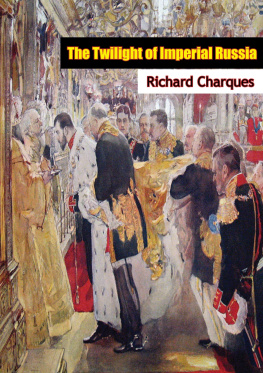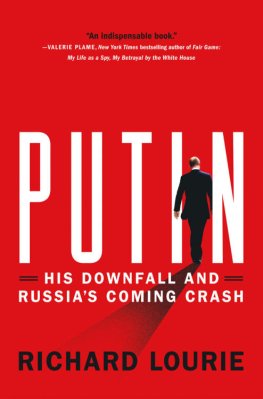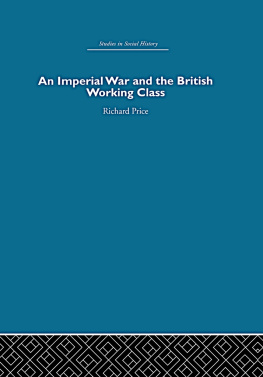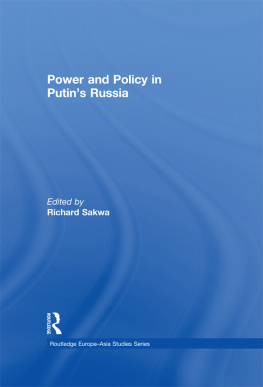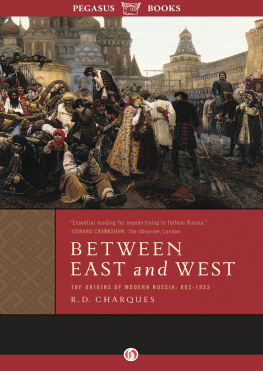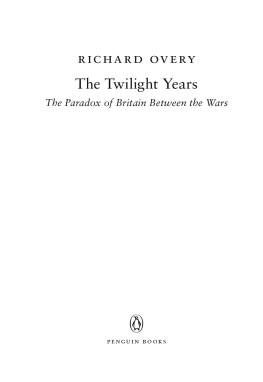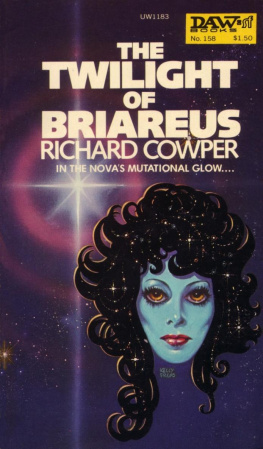Richard Charques - The Twilight of Imperial Russia
Here you can read online Richard Charques - The Twilight of Imperial Russia full text of the book (entire story) in english for free. Download pdf and epub, get meaning, cover and reviews about this ebook. year: 2016, publisher: PicklePartners, genre: Religion. Description of the work, (preface) as well as reviews are available. Best literature library LitArk.com created for fans of good reading and offers a wide selection of genres:
Romance novel
Science fiction
Adventure
Detective
Science
History
Home and family
Prose
Art
Politics
Computer
Non-fiction
Religion
Business
Children
Humor
Choose a favorite category and find really read worthwhile books. Enjoy immersion in the world of imagination, feel the emotions of the characters or learn something new for yourself, make an fascinating discovery.
- Book:The Twilight of Imperial Russia
- Author:
- Publisher:PicklePartners
- Genre:
- Year:2016
- Rating:5 / 5
- Favourites:Add to favourites
- Your mark:
- 100
- 1
- 2
- 3
- 4
- 5
The Twilight of Imperial Russia: summary, description and annotation
We offer to read an annotation, description, summary or preface (depends on what the author of the book "The Twilight of Imperial Russia" wrote himself). If you haven't found the necessary information about the book — write in the comments, we will try to find it.
The Twilight of Imperial Russia — read online for free the complete book (whole text) full work
Below is the text of the book, divided by pages. System saving the place of the last page read, allows you to conveniently read the book "The Twilight of Imperial Russia" online for free, without having to search again every time where you left off. Put a bookmark, and you can go to the page where you finished reading at any time.
Font size:
Interval:
Bookmark:


This edition is published by PICKLE PARTNERS PUBLISHINGwww.pp-publishing.com
To join our mailing list for new titles or for issues with our bookspicklepublishing@gmail.com
Or on Facebook
Text originally published in 1959 under the same title.
Pickle Partners Publishing 2016, all rights reserved. No part of this publication may be reproduced, stored in a retrieval system or transmitted by any means, electrical, mechanical or otherwise without the written permission of the copyright holder.
Publishers Note
Although in most cases we have retained the Authors original spelling and grammar to authentically reproduce the work of the Author and the original intent of such material, some additional notes and clarifications have been added for the modern readers benefit.
We have also made every effort to include all maps and illustrations of the original edition the limitations of formatting do not allow of including larger maps, we will upload as many of these maps as possible.
THE TWILIGHT OF IMPERIAL RUSSIA
BY
RICHARD CHARQUES
Contents
To H. B.
in memory
The provinces of European Russia
The Russian Empire: Communications and principal towns and industrial centres in the early years of the twentieth century
The Far Eastern theatre of war, 1904-5
The Eastern Front, 1914-15
Since the reign of the last of the Romanov tsars is a classic testing-ground of Marxist theory, it is more than ordinarily vain to look to Soviet historians for the objective account of the period which, counsel of perfection though it may be, still represents the normal ideal of western historiography. In this narrative history of the reign I have pursued no special thesis nor subscribed to any particular doctrine of historical causation. I have kept to the limits of the reign, adding only by way of balance to the introductory survey of the condition of Russia at the accession a short epilogue on the logic of events between the fall of the monarchy and the Bolshevik seizure of power. I have not attempted to describe in any detail that crucial period of eight months between February and October 1917 since it appears to me to belong to a phase of Russian history that properly takes in the civil war which followed. This I propose to make the subject of a later work.
I have had in mind three main points of emphasis. The Bolsheviks contributed little or nothing to the revolution which overthrew the autocracy of the tsars and swept away the dynasty. Until 1917, indeed, their prospects appeared to be no better than those of several rival groups of conspirators or propagandists in exile. I have therefore tried to chart the tides and currents represented by all the other factions and parties, legal and underground, which swelled the revolutionary cataclysm.
I have further indicated some of the ifs of the reign which still exercise the imagination. Amid the revolutionary momentum of events during those twenty-three years there was an astonishing element, as perhaps there always is at periods of social crisis, of the fortuitous. What might have happened is not history, but in retrospect the Russian scene between 1894 and 1917 is strewn with the remains of things hypothetical. Though in the last resort the shaping forces of history are no doubt impersonal, the personal equation in politics is never negligible. No law of Russian historical development compelled Nicholas to accept the advice of Pobedonostsev or to reject the opportunity of coming to terms with the Duma even as late as 1915.
The confusion of the Russian liberals provides a third and leading point of emphasis in The Twilight of Imperial Russia . In itself it presents a remarkable study of politics as the art of the impossible and at the same time lights up a principal cause of the Bolshevik triumph. The prospects of liberalism of any sort in Russia were admittedly slender, since the authoritarian bias of Russian political tradition was deep-rooted. But the familiar argument that liberalism was doomed in the absence of a powerful middle class is valid only if Russian liberalism is identified with the forms of liberalism in the west. Russian liberalism of this borrowed variety, which is specially associated with the name of Miliukov and which stood for complete parliamentary democracy in an empire more than three parts illiterate and held together for centuries only by an unqualified absolutism, undoubtedly invited defeat. But there was also a native form of Russian liberalism which had sprung from practical reform, however rudimentary, and taken firm root in a system, however cramped and inhibited, of local self-government. And it was this liberalism from within, which was more concerned with the substance of local needs in the peasant vastness of Russia than with the shadow of popular sovereignty, that was absorbed into an alien and doctrinal liberalism evolved jointly from western practice and a vestigial legal Marxism. In 1905, at what might indeed have proved a turning point in the history of tsarist Russia, in the interval before the first Duma and in the first Duma itself, the titular liberals were in effect revolutionaries. As such they were easily outbidden in the course of events by those of more extreme purpose, whose dialectical distinction between a bourgeois and a proletarian revolution they had all too blindly accepted.
Is it far-fetched to suggest that the error of Russian liberalism before 1917 may have some relevance to conditions in Russia today? If the absolutism of the Stalin period is beyond recall, the hope of a more liberal regime in Russia, and with it of avoiding final catastrophe in the relations of Russia and the west, must surely lie in a process of internal reform that is both cautious and conservative. To look for more than that, it seems to me, is doctrinaire folly.
Except for the attempt to avoid over-simplification on the one hand and narrative confusion on the other in presenting so intricate a pattern of events, the problem that more than any other has vexed me in this short history of the reign is one of proportion. Most studies of the decay of tsarism have concentrated on the phase of administrative collapse in the world war and on the history and doctrine of Bolshevism. These, of course, are central aspects of the present work. But unless it was to fill the greater part of the book there was no choice but to condense rather severely the war period. The origins and the ideological controversies of Bolshevism I have sketched only in passing, since detailed accounts are available elsewhere. On the admittedly academic issue of whether or not the Bolshevik accession to power was inevitable it may be worthwhile making the simple point that the idea of inevitability in history seems essentially anti-historic. Surely to no nation, wrote Winston Churchill in The World Crisis : The Aftermath , has Fate been more malignant than to Russia. Her ship went down in sight of port. She had actually weathered the storm when all was cast away. That Churchillian image of the Russian events of 1917 bears no close correspondence to the truth. But it is a degree less false, I think, than the notion that the stars in their courses moved in sympathy with the industrial proletariat.
A word on dates. Russia did not adopt the western calendar until February 1918, and the Old Style of Russian chronology, twelve days earlier than ours in the nineteenth century, thirteen days earlier in the twentieth, is a perpetual source of confusion. I have thought it best, however, to keep to the Old Style, though for international and other notable occasions I have given the date in both the Old and the New.
Next pageFont size:
Interval:
Bookmark:
Similar books «The Twilight of Imperial Russia»
Look at similar books to The Twilight of Imperial Russia. We have selected literature similar in name and meaning in the hope of providing readers with more options to find new, interesting, not yet read works.
Discussion, reviews of the book The Twilight of Imperial Russia and just readers' own opinions. Leave your comments, write what you think about the work, its meaning or the main characters. Specify what exactly you liked and what you didn't like, and why you think so.

